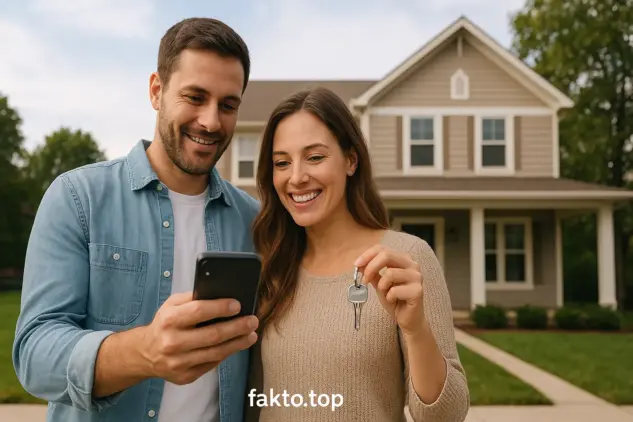Buy US Real Estate with Crypto: Mortgages, Tax Guide & IRS Laws
How to Buy a House with Crypto: Your Guide to Turning Digital Gains into American Real Estate Dreams
In the world of digital wealth, every serious investor eventually faces the same challenge: how to turn volatile crypto gains into a stable, tangible asset. The answer is not to exit the market but to evolve. Real estate in the United States is the ultimate destination for investors looking to transform crypto profits into long-term security and legacy value.
Buying property with crypto is not a casual transaction. It is a strategic mission. The U.S. legal and financial systems are built for dollars, not decentralized assets. But that is exactly what makes this move powerful. Once you master the process, you are not just cashing out—you are creating an asset that lives beyond the blockchain.

This guide is structured as a three-part quest—three gateways to property ownership—each designed for different risk levels and tax situations. You will learn how to unlock liquidity without selling, how to navigate the IRS minefield, and how to go fully on-chain if you are ready for the direct play. Let us start with the most accessible route: crypto-backed mortgage lending in the United States.
Gateway 1: The Zero-Compromise Approach — Crypto Mortgage Lenders US
Think of this as the bridge between DeFi and traditional finance. Crypto mortgage lending allows you to keep your portfolio intact while gaining access to U.S. dollars for a real estate purchase. You are not selling your Bitcoin or Ethereum; you are borrowing against it. This method avoids triggering a taxable event while preserving your upside potential if crypto prices rise. This is the most mainstream and least disruptive way to enter the U.S. real estate market with crypto.
The LTV Tightrope: Understanding Loan-to-Value Ratios (LTV)
Loan-to-Value, or LTV, defines how much you can borrow compared to the value of your collateral. In crypto-backed lending, this number is deliberately conservative because of market volatility. A lender might allow a 50% LTV—meaning you would need $1 million in crypto to secure a $500,000 loan. This protects both sides: you get liquidity without selling, and the lender limits risk in case your digital assets drop in value. Most lenders accept major cryptocurrencies such as Bitcoin (BTC), Ethereum (ETH), and stablecoins like USDC or USDT. The higher the volatility, the lower your possible LTV.
The Margin Call Risk: Your Biggest Enemy in a Volatile Market
Here is the hidden boss fight. When your collateral value drops below a critical threshold, you face what is known as a margin call. The lender can demand additional crypto to restore balance—or worse, liquidate part of your collateral automatically. A sharp dip in the market can cost you both your crypto and your home opportunity in one move. To manage this, maintain a safe buffer. Smart investors keep their LTV around 30–40%, giving themselves room to survive a downturn without triggering liquidation. Avoid high leverage at all costs—it is the one way to lose both assets at once.

Which Lenders Offer This Service?
Several licensed U.S.-based lenders now provide crypto mortgage services. These companies operate in compliance with U.S. financial laws, offering fixed or variable-rate loans secured by digital assets. Some focus on luxury properties, while others specialize in standard residential homes. Each sets its own LTV ratios, accepted currencies, and loan durations, so comparing terms is essential before locking in your collateral.
Gateway 2: The Final Boss Battle — Tax Implications of Buying a House with Bitcoin
For U.S. crypto investors, taxes are the ultimate gatekeeper. The Internal Revenue Service (IRS) treats crypto as property, not currency, which means every time you sell, swap, or spend crypto—including buying real estate—you trigger a taxable event. When your Bitcoin leaves your wallet for a title deed, the IRS expects to see a capital gains report, so planning ahead is crucial.
The IRS View: Why Your Crypto is Classified as Property
When the IRS labeled crypto as property, it effectively rewrote the rules of wealth conversion. Unlike cash, property triggers capital gains taxes whenever it is sold or exchanged. Buying a house with Bitcoin is legally equivalent to selling that Bitcoin at its current market value, even if you never touch fiat. For instance, if you acquired BTC for $20,000 and use it at $60,000, that $40,000 gain is taxable. Many investors fall into traps by misreporting, underreporting, or ignoring these gains, which can lead to audits, penalties, and serious fines. To avoid such issues, you must review the common compliance risks detailed in Crypto Tax Mistakes in the USA before making any real estate transactions.
Long-Term vs. Short-Term Gains: The Million-Dollar Difference
The duration for which you hold your crypto determines how much tax you owe. If your coins have been held for more than a year, you qualify for long-term capital gains rates, which are generally lower than short-term rates that align with ordinary income brackets. The difference can be substantial, and selling too soon could result in paying up to twice the taxes compared to a strategic long-term hold. Before converting crypto into property, it is wise to run the numbers and consult the Complete US Crypto Tax Guide to gain a deeper understanding of reporting, deductions, and compliance strategies.

The Need for an Audit Trail and Clean Records
In a crypto-to-property transaction, documentation is everything. The IRS expects clear, traceable records of acquisition prices, sale values, and exchange conversions. That means every wallet transfer, exchange statement, and loan agreement must be logged. The cleaner your audit trail, the smoother your tax season will be. Failing to maintain records can cause delays in property title transfers and potential scrutiny from financial institutions. Treat your documentation as part of your investment strategy—it is what separates a professional investor from an amateur trader.
Gateway 3: The Direct Play — Finding Crypto-Savvy Sellers
This is the purest form of the crypto real estate dream: a peer-to-peer property deal where both buyer and seller agree to transact in digital currency. While rare, these deals are happening across the U.S., especially in crypto-friendly states like Florida, Texas, and California. The main advantage here is ideological and practical freedom: you control the process end-to-end, avoiding conventional fiat conversions.
Escrow and Title: The Trust Layer in a Trustless System
Even in a blockchain deal, you cannot skip the traditional safety nets. An escrow or title company acts as a stabilizing bridge, ensuring that both assets—crypto and property—are exchanged securely. Typically, the buyer transfers crypto to a licensed escrow service that holds it until the title transfer is verified. This system prevents fraud and manages price manipulation during closing. Because crypto prices move fast, these services often include a temporary conversion layer to stablecoins or USD to preserve value during the transfer period, guaranteeing that both parties lock in the agreed property value.
Is It Really Direct? The USD Conversion Reality
Despite the headline appeal of “buying a house with Bitcoin,” most deals end up involving U.S. dollars at some stage. Sellers often prefer to receive USD for regulatory and tax simplicity. Even when the buyer pays in crypto, the escrow or title service usually performs an instant conversion. This makes the transaction legally recognizable in U.S. property records while still allowing the buyer to use crypto as the funding source. In short, direct crypto deals are possible, but they live in a hybrid world—part on-chain, part traditional.

The Legal Reality and FinCEN
On paper, crypto serves as the payment medium, not as proof of ownership. County title offices do not care about blockchain hashes; they recognize only the deed filed in their system. What matters is traceability: regulators like FinCEN (Financial Crimes Enforcement Network) treat large crypto transactions the same as all-cash deals. That means identity checks, AML (Anti-Money Laundering) verification, and detailed reporting are mandatory. It is not loophole territory—it is just a faster, alternative payment rail feeding into the same legal framework.
The Next Frontier: Tokenized Real Estate & Fractional Ownership
| Criteria | Gateway 1: Crypto Mortgage Lenders | Gateway 2: Direct Purchase (Sell to Fiat) | Gateway 3: Tokenized Ownership |
|---|---|---|---|
| Legal Focus | Traditional Mortgage (Loan Agreement) | Capital Gains Tax (IRS Compliance) | SEC Compliance (Securities Law) |
| Crypto Liquidity | High. Asset is retained as collateral. | Low. Asset is sold/converted. | High. Asset is a tradeable token. |
| Primary Risk | Margin Call due to LTV volatility. | Price volatility during closing window. | Regulatory Risk / Secondary market token volatility. |
| Taxable Event | No. Loan is not a sale. | Yes. Immediately upon conversion to fiat. | Yes/No. Depends on token sale (not purchase). |
| Transaction Speed | 4-8 weeks (Due to underwriting) | 1-4 weeks (If crypto is pre-held in wallet) | Immediate (Token purchase) |
| Capital Requirements | Only 30-50% LTV for collateral. | 100% of the purchase price is required. | Low (Fractional ownership stake). |
Most crypto investors think in absolutes: either you buy a house directly with Bitcoin, or you stay in digital assets. Tokenized real estate changes that logic. It lets you own a piece of property—verified on-chain, tradeable like a stock, and managed through smart contracts. This technology strips real estate of friction, building it for Web3 liquidity.
Tokenized Ownership: The Power of Fractionalization
Tokenization solves one of real estate’s biggest flaws—its illiquidity. Traditional property ownership locks your capital for years; tokenized ownership frees it instantly. You can enter or exit a property position with the same ease you trade crypto. This makes real estate behave more like a yield-generating digital asset than a static piece of land. If full home ownership feels heavy or legally complicated, you can explore the benefits of Fractional Real Estate with Crypto as an accessible way to diversify across multiple properties without losing liquidity.
DAO Ownership: Buying Investment Property with Your Community
In the tokenized model, communities can pool funds to buy entire properties through Decentralized Autonomous Organizations (DAOs). Each contributor holds governance tokens that determine decisions—rental strategy, resale timing, or reinvestment plans. The structure flips the old landlord model on its head. Instead of one owner and many tenants, a DAO can collectively manage assets and distribute rental income on-chain. This model is already emerging in U.S. cities, offering a glimpse of where real estate meets collective finance.

Legal Friction: What the Blockchain Doesn’t Solve
Even the most elegant smart contract still collides with analog systems. County recorders do not read Ethereum, and zoning boards do not care about DeFi. The legal anchor remains in traditional documentation. That is why serious tokenization projects in the U.S. must comply with SEC rules. Tokens representing equity or income streams are considered securities, and they must be issued under exemptions (such as Reg D or Reg A+). Tokenization simplifies investment and management, but not the underlying property law.
Real-World Case Studies & Investor Frameworks
Still, even in this future-forward space, theory only gets you so far. Let us look at how U.S. investors are actually making these transactions work in the real world, converting crypto into square footage.
Case Study 1: Luxury Condo in Miami
A Miami-based buyer acquired a $1.5 million condo using a combination of Bitcoin and Ethereum. Rather than selling the crypto outright and waiting for bank transfers, they worked with a licensed payment intermediary that converted the digital assets to USD just hours before closing. The county deed reflected standard ownership. The buyer successfully timed the conversion to qualify for long-term capital gains, minimizing their tax liability. The key takeaway: using crypto as a funding source requires precise timing, clear documentation, and trusted intermediaries.
Case Study 2: Crypto-Backed Mortgage in Texas
In Austin, a buyer used Ethereum as collateral for a $750,000 mortgage through a licensed U.S. lender. The loan-to-value ratio was set at 60%, and the Ethereum remained in a custody wallet until disbursal. The lender released the USD directly to the title company, preserving the buyer’s crypto portfolio. This hybrid approach allowed the buyer to maintain market exposure while acquiring property without a conventional sale. This model highlights an emerging framework for U.S. investors: crypto-backed loans provide liquidity without triggering immediate taxable events.
Investor Frameworks from the Field
Across these examples, certain practices repeat: meticulous recordkeeping, working with licensed intermediaries, and selecting U.S. states with crypto-friendly infrastructure. Buyers who approach property acquisition as a multi-step strategy—whether through direct purchase, tokenized shares, or collateralized loans—maximize flexibility and minimize regulatory friction. Real estate is not a plug-and-play crypto swap. But when structured correctly, it becomes an extension of the investor’s portfolio, a bridge between volatile digital holdings and stable, tangible wealth.

Your Final Playbook — Steps to US Homeownership & Conclusion
Step 1: Prepare Your Taxes First
Before committing to any property purchase, understand your crypto tax exposure. Identify which assets will trigger long-term or short-term capital gains, and maintain a complete audit trail of acquisition prices and transaction histories. Consult a CPA experienced in digital assets to prevent surprises during reporting. This step alone can save tens of thousands in U.S. taxes and ensures a smoother closing.
Step 2: Choose Your Gateway
Decide whether you will go through a crypto-backed mortgage, a direct purchase with crypto, or a tokenized fractional investment. Each path has trade-offs. Collateralized loans preserve crypto exposure but carry margin call risk. Direct purchases offer speed and simplicity but require careful escrow management. Tokenized ownership allows partial exposure and liquidity but relies on compliance with SEC regulations. Match your approach to your risk tolerance, portfolio size, and long-term goals.
Step 3: Secure Crypto-Savvy Professionals
Your success depends on the team. Engage real estate agents, escrow providers, title companies, and CPAs who understand digital assets. Professionals familiar with crypto ensure your transaction is compliant, efficient, and insulated from avoidable risks. Their expertise bridges the gap between blockchain operations and traditional property law.
Conclusion
Turning crypto into U.S. real estate is no longer theoretical. With strategy, careful planning, and the right intermediaries, digital assets can fund tangible, stable wealth. Whether through crypto-backed mortgages, direct purchases, or tokenized shares, each gateway provides a path from volatile holdings to property ownership. The core message is simple: diligence and planning are your keys. Treat every transaction as a structured play, track your tax exposure, and leverage professionals who understand both worlds. By doing so, your digital gains can secure real-world assets—creating stability, portfolio diversity, and the foundation for lasting wealth.
Disclaimer: Important Notice
This material is provided for informational purposes only and is not intended as financial, tax, legal, or investment advice. Cryptocurrencies and real estate transactions involve high risks. Always consult with a licensed attorney, tax advisor (CPA), or financial professional experienced in digital assets and U.S. jurisdiction before making any decisions related to buying, selling, or using cryptocurrency to acquire property.

1 Comment on "Buy US Real Estate with Crypto: Mortgages, Tax Guide & IRS Laws"
Outstanding post, I think people should learn a lot from this web blog its very user pleasant.